Analyzing the Ecology of Childhood: Cultural and Social Development
VerifiedAdded on 2022/09/13
|7
|1700
|43
Essay
AI Summary
This essay delves into the ecology of childhood, examining the multifaceted influences that shape a child's development. It explores the assumption that children are supported by their parents, shaping their cultural beliefs, religious affiliations, and eating habits. The essay contrasts the author's views with those of 'Ms. Kylie,' highlighting different perspectives on how children shape their learning and how families determine cultural influences. It further discusses the formation of a child's identity through social and cultural factors, referencing Bronfenbrenner's ecological systems theory. The essay also addresses cultural changes through interaction and the importance of raising culturally conversant and sensitive children. Practical ways to promote cultural empathy are suggested, including exploring diverse cultures through books, films, and experiences. The essay concludes by emphasizing the significance of creating trustworthy relationships with children to foster a sense of security and support, promoting their overall development and learning. Desklib provides access to similar essays and study tools for students.
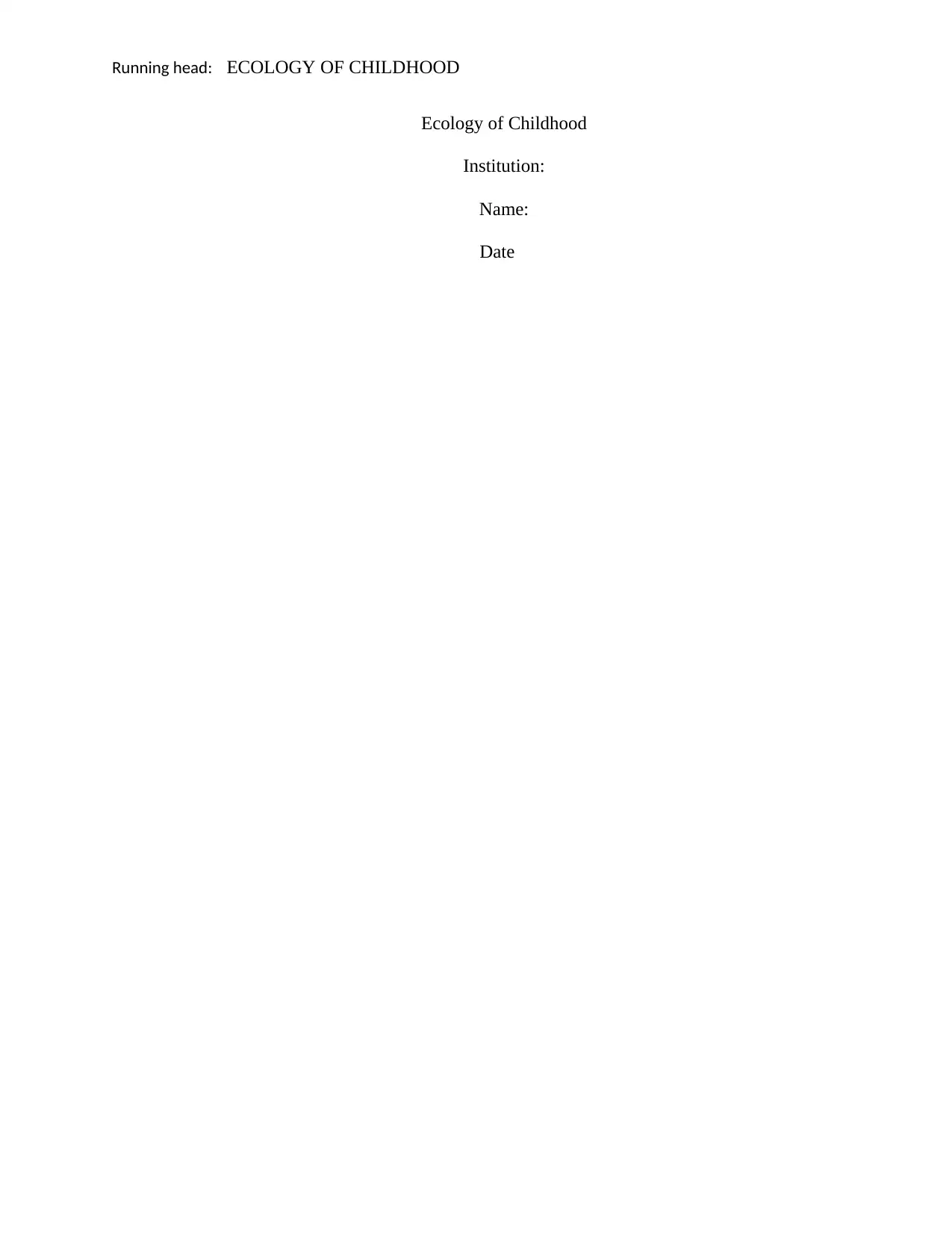
Running head: ECOLOGY OF CHILDHOOD
Ecology of Childhood
Institution:
Name:
Date
Ecology of Childhood
Institution:
Name:
Date
Paraphrase This Document
Need a fresh take? Get an instant paraphrase of this document with our AI Paraphraser
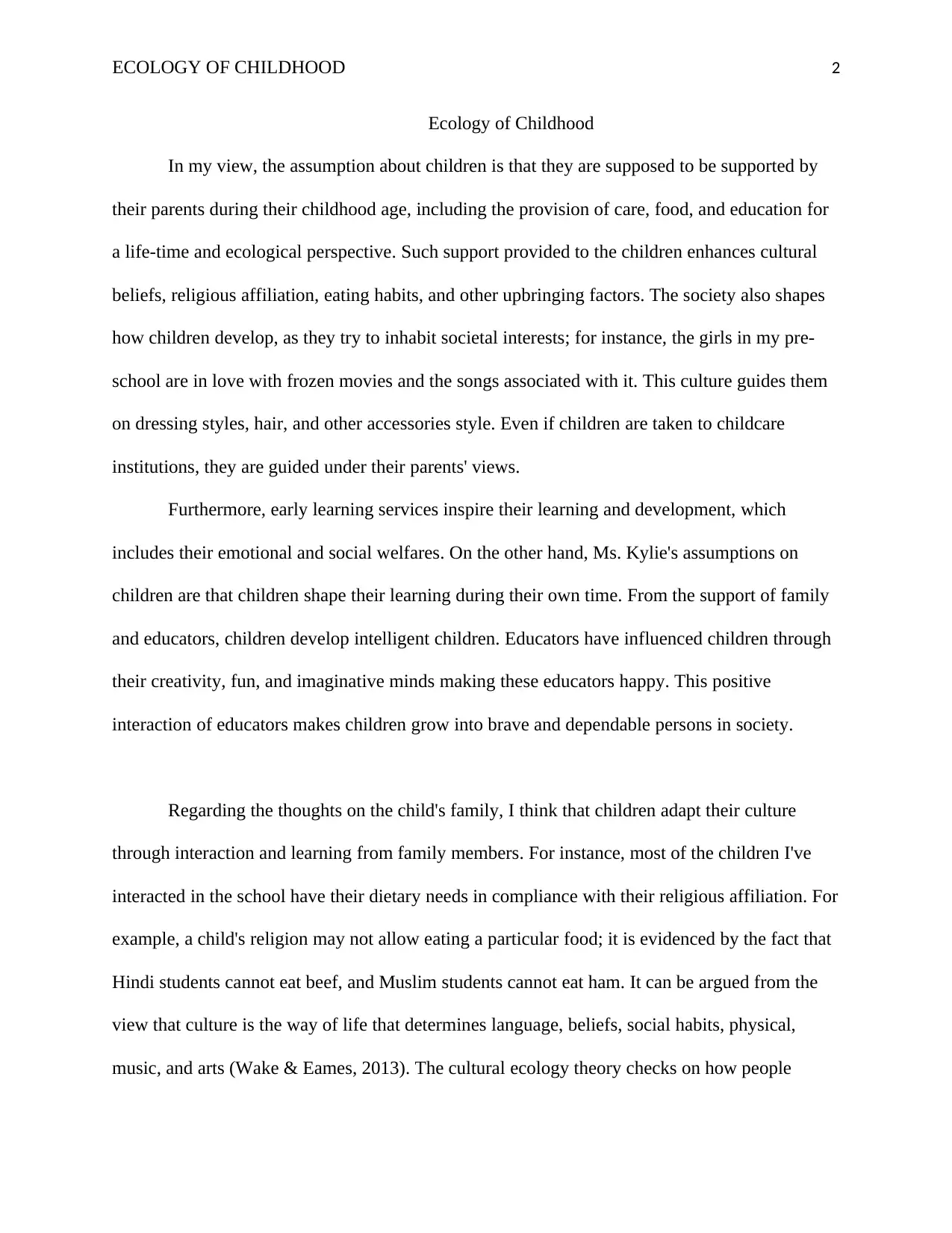
ECOLOGY OF CHILDHOOD 2
Ecology of Childhood
In my view, the assumption about children is that they are supposed to be supported by
their parents during their childhood age, including the provision of care, food, and education for
a life-time and ecological perspective. Such support provided to the children enhances cultural
beliefs, religious affiliation, eating habits, and other upbringing factors. The society also shapes
how children develop, as they try to inhabit societal interests; for instance, the girls in my pre-
school are in love with frozen movies and the songs associated with it. This culture guides them
on dressing styles, hair, and other accessories style. Even if children are taken to childcare
institutions, they are guided under their parents' views.
Furthermore, early learning services inspire their learning and development, which
includes their emotional and social welfares. On the other hand, Ms. Kylie's assumptions on
children are that children shape their learning during their own time. From the support of family
and educators, children develop intelligent children. Educators have influenced children through
their creativity, fun, and imaginative minds making these educators happy. This positive
interaction of educators makes children grow into brave and dependable persons in society.
Regarding the thoughts on the child's family, I think that children adapt their culture
through interaction and learning from family members. For instance, most of the children I've
interacted in the school have their dietary needs in compliance with their religious affiliation. For
example, a child's religion may not allow eating a particular food; it is evidenced by the fact that
Hindi students cannot eat beef, and Muslim students cannot eat ham. It can be argued from the
view that culture is the way of life that determines language, beliefs, social habits, physical,
music, and arts (Wake & Eames, 2013). The cultural ecology theory checks on how people
Ecology of Childhood
In my view, the assumption about children is that they are supposed to be supported by
their parents during their childhood age, including the provision of care, food, and education for
a life-time and ecological perspective. Such support provided to the children enhances cultural
beliefs, religious affiliation, eating habits, and other upbringing factors. The society also shapes
how children develop, as they try to inhabit societal interests; for instance, the girls in my pre-
school are in love with frozen movies and the songs associated with it. This culture guides them
on dressing styles, hair, and other accessories style. Even if children are taken to childcare
institutions, they are guided under their parents' views.
Furthermore, early learning services inspire their learning and development, which
includes their emotional and social welfares. On the other hand, Ms. Kylie's assumptions on
children are that children shape their learning during their own time. From the support of family
and educators, children develop intelligent children. Educators have influenced children through
their creativity, fun, and imaginative minds making these educators happy. This positive
interaction of educators makes children grow into brave and dependable persons in society.
Regarding the thoughts on the child's family, I think that children adapt their culture
through interaction and learning from family members. For instance, most of the children I've
interacted in the school have their dietary needs in compliance with their religious affiliation. For
example, a child's religion may not allow eating a particular food; it is evidenced by the fact that
Hindi students cannot eat beef, and Muslim students cannot eat ham. It can be argued from the
view that culture is the way of life that determines language, beliefs, social habits, physical,
music, and arts (Wake & Eames, 2013). The cultural ecology theory checks on how people
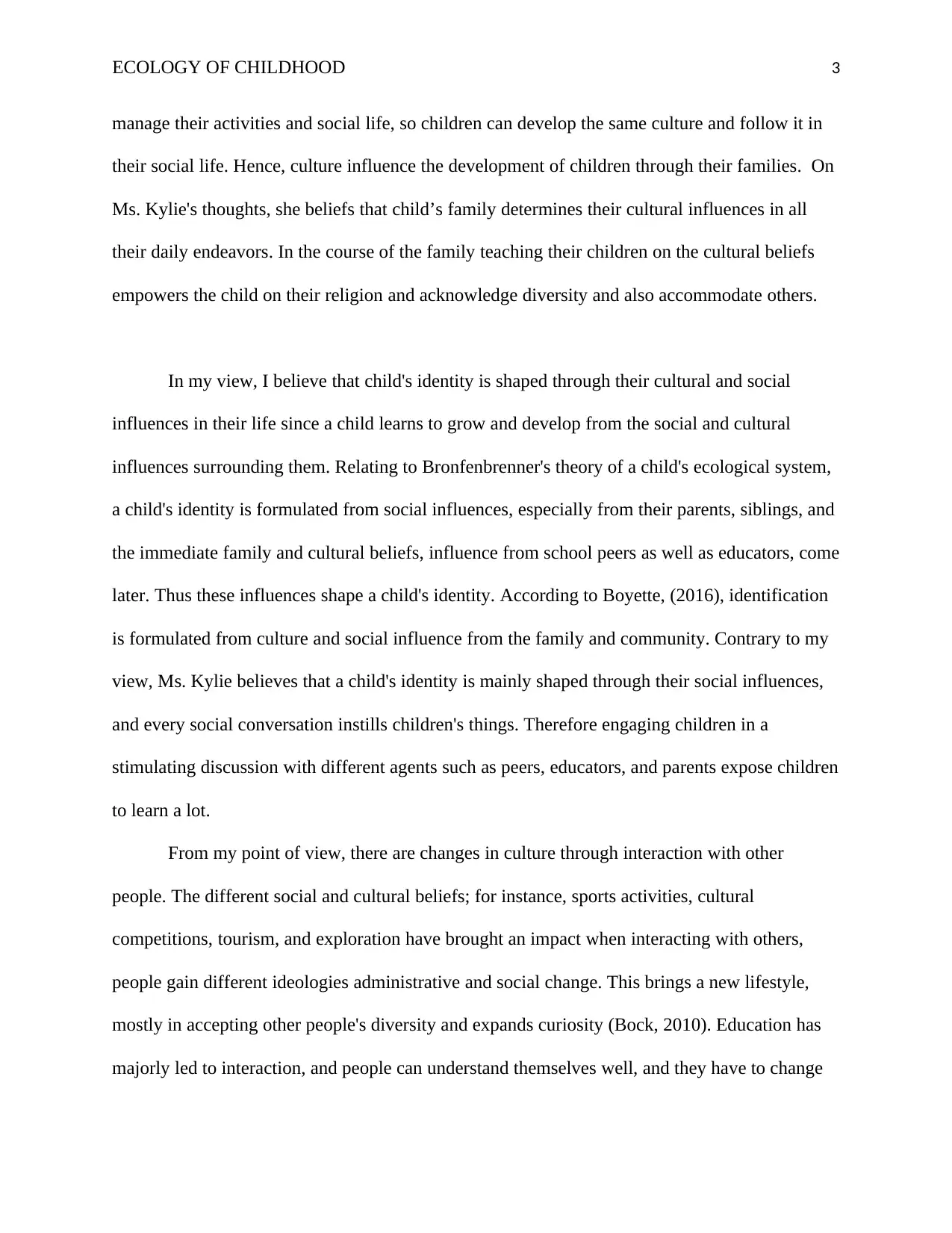
ECOLOGY OF CHILDHOOD 3
manage their activities and social life, so children can develop the same culture and follow it in
their social life. Hence, culture influence the development of children through their families. On
Ms. Kylie's thoughts, she beliefs that child’s family determines their cultural influences in all
their daily endeavors. In the course of the family teaching their children on the cultural beliefs
empowers the child on their religion and acknowledge diversity and also accommodate others.
In my view, I believe that child's identity is shaped through their cultural and social
influences in their life since a child learns to grow and develop from the social and cultural
influences surrounding them. Relating to Bronfenbrenner's theory of a child's ecological system,
a child's identity is formulated from social influences, especially from their parents, siblings, and
the immediate family and cultural beliefs, influence from school peers as well as educators, come
later. Thus these influences shape a child's identity. According to Boyette, (2016), identification
is formulated from culture and social influence from the family and community. Contrary to my
view, Ms. Kylie believes that a child's identity is mainly shaped through their social influences,
and every social conversation instills children's things. Therefore engaging children in a
stimulating discussion with different agents such as peers, educators, and parents expose children
to learn a lot.
From my point of view, there are changes in culture through interaction with other
people. The different social and cultural beliefs; for instance, sports activities, cultural
competitions, tourism, and exploration have brought an impact when interacting with others,
people gain different ideologies administrative and social change. This brings a new lifestyle,
mostly in accepting other people's diversity and expands curiosity (Bock, 2010). Education has
majorly led to interaction, and people can understand themselves well, and they have to change
manage their activities and social life, so children can develop the same culture and follow it in
their social life. Hence, culture influence the development of children through their families. On
Ms. Kylie's thoughts, she beliefs that child’s family determines their cultural influences in all
their daily endeavors. In the course of the family teaching their children on the cultural beliefs
empowers the child on their religion and acknowledge diversity and also accommodate others.
In my view, I believe that child's identity is shaped through their cultural and social
influences in their life since a child learns to grow and develop from the social and cultural
influences surrounding them. Relating to Bronfenbrenner's theory of a child's ecological system,
a child's identity is formulated from social influences, especially from their parents, siblings, and
the immediate family and cultural beliefs, influence from school peers as well as educators, come
later. Thus these influences shape a child's identity. According to Boyette, (2016), identification
is formulated from culture and social influence from the family and community. Contrary to my
view, Ms. Kylie believes that a child's identity is mainly shaped through their social influences,
and every social conversation instills children's things. Therefore engaging children in a
stimulating discussion with different agents such as peers, educators, and parents expose children
to learn a lot.
From my point of view, there are changes in culture through interaction with other
people. The different social and cultural beliefs; for instance, sports activities, cultural
competitions, tourism, and exploration have brought an impact when interacting with others,
people gain different ideologies administrative and social change. This brings a new lifestyle,
mostly in accepting other people's diversity and expands curiosity (Bock, 2010). Education has
majorly led to interaction, and people can understand themselves well, and they have to change
⊘ This is a preview!⊘
Do you want full access?
Subscribe today to unlock all pages.

Trusted by 1+ million students worldwide
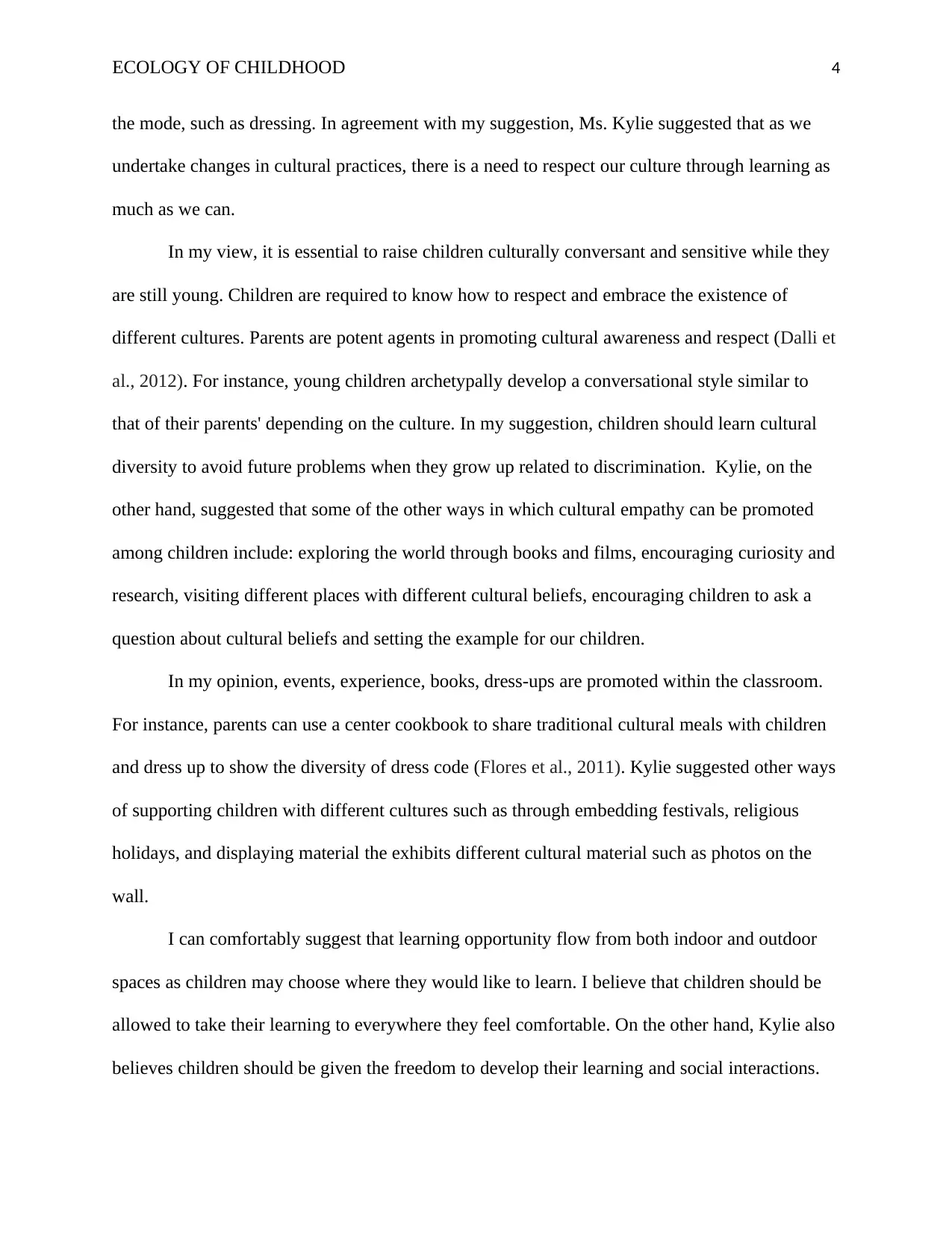
ECOLOGY OF CHILDHOOD 4
the mode, such as dressing. In agreement with my suggestion, Ms. Kylie suggested that as we
undertake changes in cultural practices, there is a need to respect our culture through learning as
much as we can.
In my view, it is essential to raise children culturally conversant and sensitive while they
are still young. Children are required to know how to respect and embrace the existence of
different cultures. Parents are potent agents in promoting cultural awareness and respect (Dalli et
al., 2012). For instance, young children archetypally develop a conversational style similar to
that of their parents' depending on the culture. In my suggestion, children should learn cultural
diversity to avoid future problems when they grow up related to discrimination. Kylie, on the
other hand, suggested that some of the other ways in which cultural empathy can be promoted
among children include: exploring the world through books and films, encouraging curiosity and
research, visiting different places with different cultural beliefs, encouraging children to ask a
question about cultural beliefs and setting the example for our children.
In my opinion, events, experience, books, dress-ups are promoted within the classroom.
For instance, parents can use a center cookbook to share traditional cultural meals with children
and dress up to show the diversity of dress code (Flores et al., 2011). Kylie suggested other ways
of supporting children with different cultures such as through embedding festivals, religious
holidays, and displaying material the exhibits different cultural material such as photos on the
wall.
I can comfortably suggest that learning opportunity flow from both indoor and outdoor
spaces as children may choose where they would like to learn. I believe that children should be
allowed to take their learning to everywhere they feel comfortable. On the other hand, Kylie also
believes children should be given the freedom to develop their learning and social interactions.
the mode, such as dressing. In agreement with my suggestion, Ms. Kylie suggested that as we
undertake changes in cultural practices, there is a need to respect our culture through learning as
much as we can.
In my view, it is essential to raise children culturally conversant and sensitive while they
are still young. Children are required to know how to respect and embrace the existence of
different cultures. Parents are potent agents in promoting cultural awareness and respect (Dalli et
al., 2012). For instance, young children archetypally develop a conversational style similar to
that of their parents' depending on the culture. In my suggestion, children should learn cultural
diversity to avoid future problems when they grow up related to discrimination. Kylie, on the
other hand, suggested that some of the other ways in which cultural empathy can be promoted
among children include: exploring the world through books and films, encouraging curiosity and
research, visiting different places with different cultural beliefs, encouraging children to ask a
question about cultural beliefs and setting the example for our children.
In my opinion, events, experience, books, dress-ups are promoted within the classroom.
For instance, parents can use a center cookbook to share traditional cultural meals with children
and dress up to show the diversity of dress code (Flores et al., 2011). Kylie suggested other ways
of supporting children with different cultures such as through embedding festivals, religious
holidays, and displaying material the exhibits different cultural material such as photos on the
wall.
I can comfortably suggest that learning opportunity flow from both indoor and outdoor
spaces as children may choose where they would like to learn. I believe that children should be
allowed to take their learning to everywhere they feel comfortable. On the other hand, Kylie also
believes children should be given the freedom to develop their learning and social interactions.
Paraphrase This Document
Need a fresh take? Get an instant paraphrase of this document with our AI Paraphraser
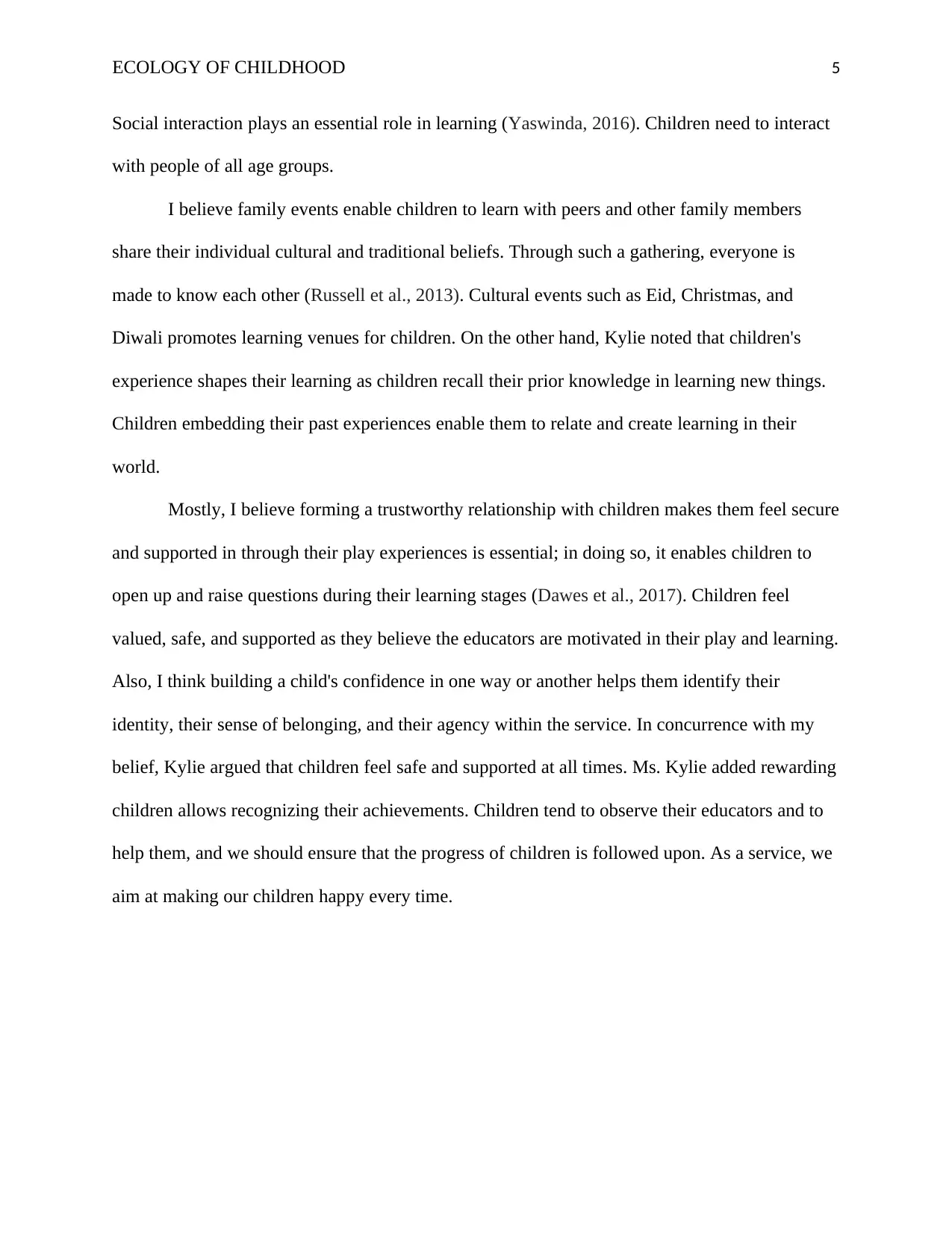
ECOLOGY OF CHILDHOOD 5
Social interaction plays an essential role in learning (Yaswinda, 2016). Children need to interact
with people of all age groups.
I believe family events enable children to learn with peers and other family members
share their individual cultural and traditional beliefs. Through such a gathering, everyone is
made to know each other (Russell et al., 2013). Cultural events such as Eid, Christmas, and
Diwali promotes learning venues for children. On the other hand, Kylie noted that children's
experience shapes their learning as children recall their prior knowledge in learning new things.
Children embedding their past experiences enable them to relate and create learning in their
world.
Mostly, I believe forming a trustworthy relationship with children makes them feel secure
and supported in through their play experiences is essential; in doing so, it enables children to
open up and raise questions during their learning stages (Dawes et al., 2017). Children feel
valued, safe, and supported as they believe the educators are motivated in their play and learning.
Also, I think building a child's confidence in one way or another helps them identify their
identity, their sense of belonging, and their agency within the service. In concurrence with my
belief, Kylie argued that children feel safe and supported at all times. Ms. Kylie added rewarding
children allows recognizing their achievements. Children tend to observe their educators and to
help them, and we should ensure that the progress of children is followed upon. As a service, we
aim at making our children happy every time.
Social interaction plays an essential role in learning (Yaswinda, 2016). Children need to interact
with people of all age groups.
I believe family events enable children to learn with peers and other family members
share their individual cultural and traditional beliefs. Through such a gathering, everyone is
made to know each other (Russell et al., 2013). Cultural events such as Eid, Christmas, and
Diwali promotes learning venues for children. On the other hand, Kylie noted that children's
experience shapes their learning as children recall their prior knowledge in learning new things.
Children embedding their past experiences enable them to relate and create learning in their
world.
Mostly, I believe forming a trustworthy relationship with children makes them feel secure
and supported in through their play experiences is essential; in doing so, it enables children to
open up and raise questions during their learning stages (Dawes et al., 2017). Children feel
valued, safe, and supported as they believe the educators are motivated in their play and learning.
Also, I think building a child's confidence in one way or another helps them identify their
identity, their sense of belonging, and their agency within the service. In concurrence with my
belief, Kylie argued that children feel safe and supported at all times. Ms. Kylie added rewarding
children allows recognizing their achievements. Children tend to observe their educators and to
help them, and we should ensure that the progress of children is followed upon. As a service, we
aim at making our children happy every time.
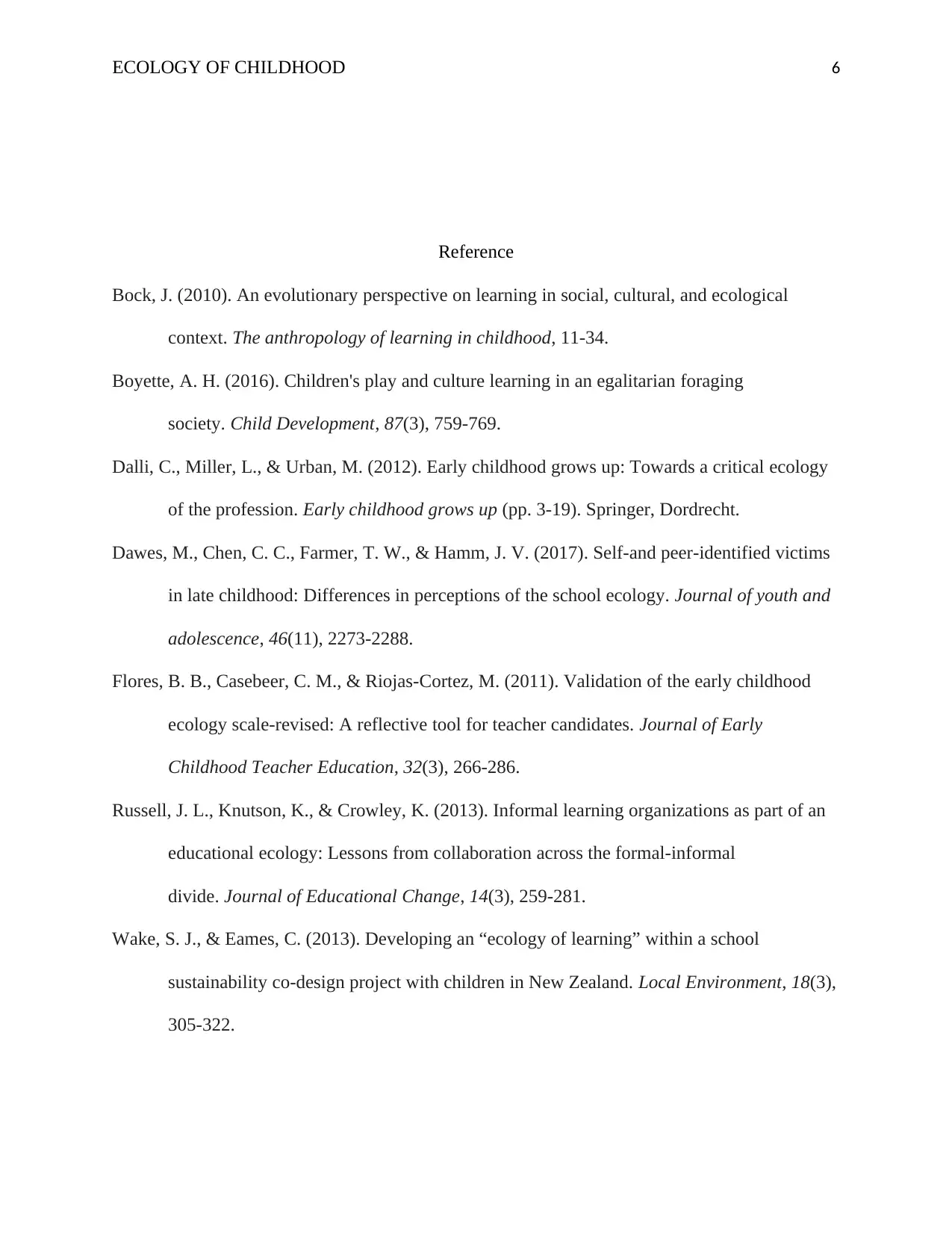
ECOLOGY OF CHILDHOOD 6
Reference
Bock, J. (2010). An evolutionary perspective on learning in social, cultural, and ecological
context. The anthropology of learning in childhood, 11-34.
Boyette, A. H. (2016). Children's play and culture learning in an egalitarian foraging
society. Child Development, 87(3), 759-769.
Dalli, C., Miller, L., & Urban, M. (2012). Early childhood grows up: Towards a critical ecology
of the profession. Early childhood grows up (pp. 3-19). Springer, Dordrecht.
Dawes, M., Chen, C. C., Farmer, T. W., & Hamm, J. V. (2017). Self-and peer-identified victims
in late childhood: Differences in perceptions of the school ecology. Journal of youth and
adolescence, 46(11), 2273-2288.
Flores, B. B., Casebeer, C. M., & Riojas-Cortez, M. (2011). Validation of the early childhood
ecology scale-revised: A reflective tool for teacher candidates. Journal of Early
Childhood Teacher Education, 32(3), 266-286.
Russell, J. L., Knutson, K., & Crowley, K. (2013). Informal learning organizations as part of an
educational ecology: Lessons from collaboration across the formal-informal
divide. Journal of Educational Change, 14(3), 259-281.
Wake, S. J., & Eames, C. (2013). Developing an “ecology of learning” within a school
sustainability co-design project with children in New Zealand. Local Environment, 18(3),
305-322.
Reference
Bock, J. (2010). An evolutionary perspective on learning in social, cultural, and ecological
context. The anthropology of learning in childhood, 11-34.
Boyette, A. H. (2016). Children's play and culture learning in an egalitarian foraging
society. Child Development, 87(3), 759-769.
Dalli, C., Miller, L., & Urban, M. (2012). Early childhood grows up: Towards a critical ecology
of the profession. Early childhood grows up (pp. 3-19). Springer, Dordrecht.
Dawes, M., Chen, C. C., Farmer, T. W., & Hamm, J. V. (2017). Self-and peer-identified victims
in late childhood: Differences in perceptions of the school ecology. Journal of youth and
adolescence, 46(11), 2273-2288.
Flores, B. B., Casebeer, C. M., & Riojas-Cortez, M. (2011). Validation of the early childhood
ecology scale-revised: A reflective tool for teacher candidates. Journal of Early
Childhood Teacher Education, 32(3), 266-286.
Russell, J. L., Knutson, K., & Crowley, K. (2013). Informal learning organizations as part of an
educational ecology: Lessons from collaboration across the formal-informal
divide. Journal of Educational Change, 14(3), 259-281.
Wake, S. J., & Eames, C. (2013). Developing an “ecology of learning” within a school
sustainability co-design project with children in New Zealand. Local Environment, 18(3),
305-322.
⊘ This is a preview!⊘
Do you want full access?
Subscribe today to unlock all pages.

Trusted by 1+ million students worldwide
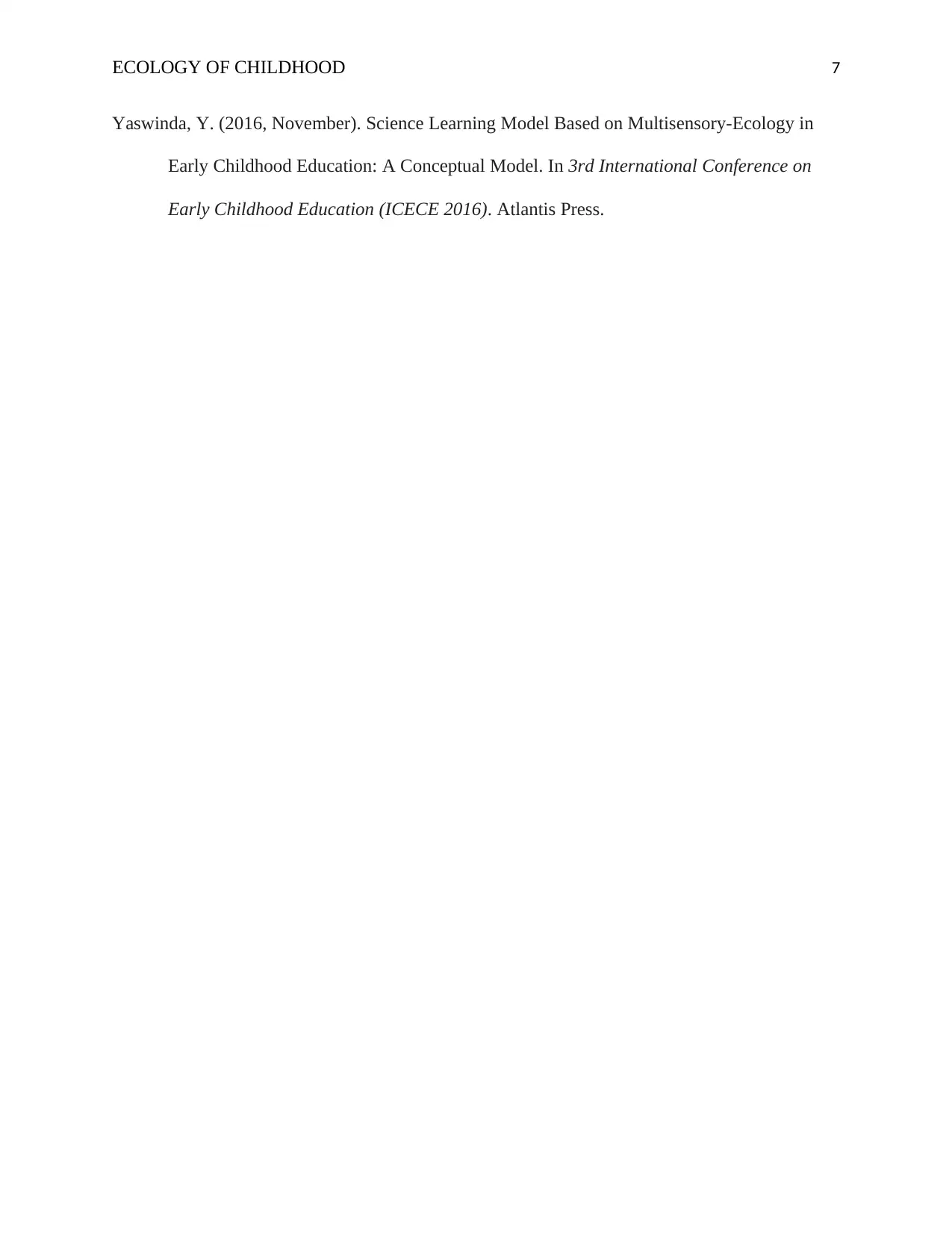
ECOLOGY OF CHILDHOOD 7
Yaswinda, Y. (2016, November). Science Learning Model Based on Multisensory-Ecology in
Early Childhood Education: A Conceptual Model. In 3rd International Conference on
Early Childhood Education (ICECE 2016). Atlantis Press.
Yaswinda, Y. (2016, November). Science Learning Model Based on Multisensory-Ecology in
Early Childhood Education: A Conceptual Model. In 3rd International Conference on
Early Childhood Education (ICECE 2016). Atlantis Press.
1 out of 7
Related Documents
Your All-in-One AI-Powered Toolkit for Academic Success.
+13062052269
info@desklib.com
Available 24*7 on WhatsApp / Email
![[object Object]](/_next/static/media/star-bottom.7253800d.svg)
Unlock your academic potential
Copyright © 2020–2026 A2Z Services. All Rights Reserved. Developed and managed by ZUCOL.




